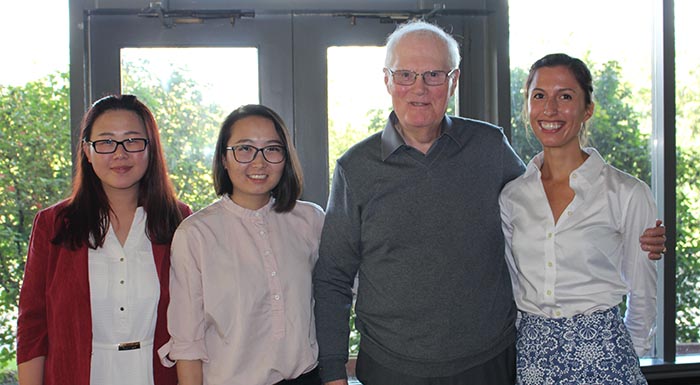
Winners of the 2016 REES 3-Minute Thesis Competition: Yanan Zheng, Arenna and Claire Doll with competition funder Prof. Emeritus Murray Hawkins.
With so many students performing so well at the REES 3-Minute Thesis Competition, judges decided to let three of them share the top prize.
This year, a total of 15 master's students conquered their nerves, distilled their thoughts and strived to clearly communicate the gist of the thesis they are working on in the Department of Resource Economics and Environmental Sociology - no easy feat when their study subjects are often laden with denser computations and policies than many others.
The annual competition prompts students to succinctly explain not only the scope of their research but also its significance, and to do so with just one slide as a prop, in three minutes or less.
"A student (in the competition) told me earlier today, 'I'm nervous because English is not my first language,'" said Peter Boxall, chair of the Department of REES. "I said that's exactly why you are doing this."
The event not only strengthens students' skills at imparting complicated research, it also exposes the new cohort of students to research going on by previous cohorts, he said.
The students who talked their way to a three-way tie for first place were Yanan Zheng, Claire Doll and Arenna (a native of Mongolia, where single names are the norm).
They will share the first and second prize money ($300 and $200 respectively), donated by Professor Emeritus Murray Hawkins through his M.H. Hawkins Research Scholarship Award. In 1964, Hawkins was the first to earn a graduate degree from what was then called the Department of Agricultural Economics and Farm Management.
Zheng is investigating the role of pig diseases in the structural changes in the Canadian hog industry, by examining the reasons for the decrease in numbers of pig farms in Quebec, Ontario and Alberta. It's a topic for which there is no existing literature to assist small producers who are struggling with the costs of disease control and prevention strategies.
Doll's thesis asks whether energy crops (low-cost plants harvested to make biofuels) can compete with traditional agriculture. Using humour and analogy to explain the dilemma, her presentation compared growers' desire to derive the best value from their land to a student with competing choices for a Friday night, searching for maximum happiness.
Arenna's research concerns consumers' purchase intentions when it comes to pork enhanced with carnosine - a naturally produced protein building block with anti-aging properties. Using data from a national survey, she's examining consumers' nutritional knowledge and health concerns to define what individuals want from carnosine and what kinds of labelling they need from government bodies.
A highly engaged crowd of about 60 faculty, students and staff (including Prof. Hawkins) attended this year's high-energy, rapid-fire event. Judges were Sandeep Mohapatra, a REES associate professor in agricultural economics; Bill White, an adjunct professor in forest economics from the Canadian Forestry Service; and Zoya Komirenko, a senior agricultural economist with the government of Alberta.
The 3 Minute Thesis Competition was created by the University of Queensland in 2008 and now occurs in universities around the world, to help graduate students hone their presentation and communication skills. While the UAlberta Faculty of Graduate Studies and Research began holding a university-wide competition in 2015, the REES event is a separate one for its MSc students.